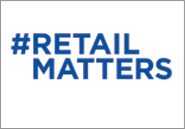Retail is the largest private sector employer in Manitoba.
Find out why #RetailMatters to Manitobans.
77,200
of Manitobans work in retail
4,692+
storefronts in Manitoba
64%
of retailers are small businesses
$3.7 Billion
Manitoba retail trade GDP
$16.2 Billion
in Manitoba Retail Sales
Source: Stats Canada
Why Manitoba Retail Matters

When your local candidates knock on your door or you meet them at an event, take time to share your experiences and the pride you have for Manitoba’s retail industry.
Be sure to also let them know that you are part of Manitoba’s largest private employment sector, and that retail also has a significant impact on the success of several other industries, such as neighbouring restaurants, as well as jobs in transportation, construction, property management, information technology, and financial services.
Here are some ideas that you can share with your candidates while spreading the word about retail:
- Retail is the largest private sector employer in Manitoba, representing 4,692 stores and a workforce of over 77,000, or about 11.5% of all employed Manitobans.
- Sales in 2022 reached $16.2 Billion, reflecting a year-over-year increase that is down slightly as stores continue to recover following the challenging pandemic years.
- The sector presently has a five-year projected additional new position requirement of 14,000 workers at all levels.
- Brick-and-mortar retail remains the foundation of healthy main streets and malls.
Every election provides Manitobans with the ability to shape their government and help to ensure that future members of the Legislative Assembly understand the role merchants play in Manitoban’s lives and our economy.
Where the Parties Stand

Retail Council of Canada sent a questionnaire to all political parties addressing the key issues affecting retail in the province. Responses are listed in the order received.
NDP RESPONSE • PC RESPONSE • LIBERAL RESPONSE
| QUESTION | NDP | PC | LIB |
| 1. Follow current legislation related to minimum wage increases? | Partially | Yes | Partially |
| 2. Support retail safety and crime reduction? | Yes | Yes | Yes |
| 3. Maintain Manitoba’s 7% PST? | Yes | Yes | Yes |
| 4. Avoid raising other taxes? | Partially | Yes | Yes |
| 5. Work with RCC on labour shortages? | Likely | Yes | Yes |
| 6. Leverage private retail to delivery government services (e.g.: liquor)? | No Response | Yes | No |
A predictable minimum wage
Unpredictable increases to the provincial minimum wage can hurt the economic stability of retail businesses and can result in lost jobs, especially amongst less experienced youth.
Recommendation
- Link inevitable future increases to the provincial minimum wage to Manitoba’s Consumer Price Index, as legislated in the Minimum Wage Adjustment Act.

Retail safety and crime

Retail employees are on the front line of endless threats to their safety, as a result of prolific and often violent offenders using a range of dangerous weapons and tactics and complex interactions with those dealing with mental health and drug-induced behaviours.
Recommendation
- Ensure the Government of Manitoba remains an active and contributing partner in collaborative discussions led by RCC between police agencies, prosecution, retailers and other important stakeholders.
Fiscal responsibility and taxes
Manitoba must find the right balance to support economic growth and opportunity through low taxation and strategic investments, while meeting the needs of Manitobans.
Recommendation
- RCC supports a balanced approach and believes it should be maintained, by not introducing additional taxes, including raising the provincial sales tax.

Retail job growth

A recent labour market study for the Manitoba retail sector indicates significant shortages in the workforce necessary to meet current and future growth expectations, including 3,800 current vacancies and, by 2028, a shortfall of 14,000 workers at all levels of the industry.
Recommendation
- RCC needs the government at the table as RCC and Manitoba’s retailers investigate and implement strategies that will help support the sector’s labour requirements and growth.
Leveraging Private Sector
Retail stores reliably meet the needs of Manitobans across the province every day, operating in efficient and innovative ways as part of a highly competitive global industry. Across Canada, most governments see retailers as valued partners, leveraging their front-line access to the public to extend the accessibility of health services, bring greater convenience for liquor sales to allow governments to better serve their communities.
Recommendation
- RCC expects the government to openly explore opportunities to collaborate with Manitoba’s private sector retailers to better serve Manitobans, including potentially expanding pharmacy health services, expanding grocery liquor sales, as well as other potential products and services.

1. Find your candidates
Use the Manitoba Elections tool to find candidates and their contact info for your riding.
2. Print your sign
Show your pride in retail by posting a photo of your retail staff holding a #RetailMatters sign or a photo of your store.
3. Tell candidates #RetailMatters
Use these links to send parties your staff photos or customized tweets.
- Liberal Party @MBLiberalParty
- New Democratic Party: @mbNDP
- Progressive Conservative Party: @PC_Manitoba
You can also send a letter to your candidate
You can also send a letter to your candidate. Let your candidates know how important retail is to Manitobans by sending a letter. RCC has created a pre-written template you can use to make sure candidates and elected officials understand retail’s impact on your community and how they can support our sector.
Contributing to political parties – what you need to know
Contributing to a campaign can be an effective way to build relationships with candidates in your riding.
Make sure that you understand the rules before lending your support to a provincial political party and its campaign.
Specific guidance on contributions in Manitoba can be found here.
Contact Us
 For questions or to find out more, contact John Graham jgraham@retailcouncil.org or 204-926-8624.
For questions or to find out more, contact John Graham jgraham@retailcouncil.org or 204-926-8624.


